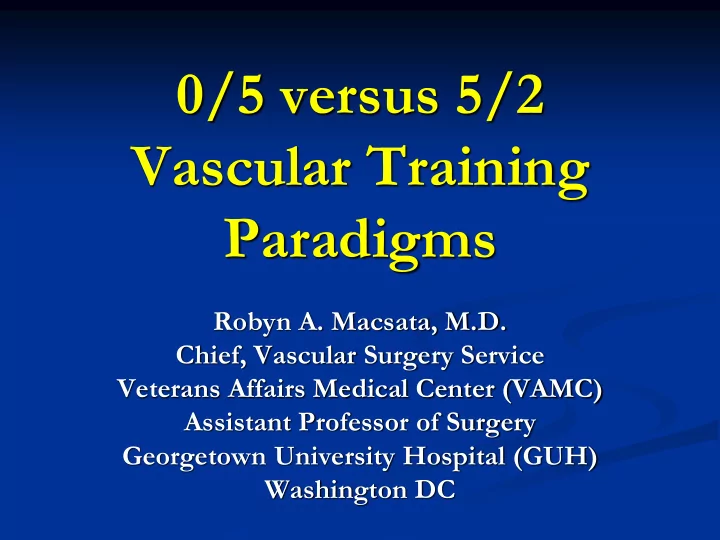

0/5 versus 5/2 Vascular Training Paradigms Robyn A. Macsata, M.D. Chief, Vascular Surgery Service Veterans Affairs Medical Center (VAMC) Assistant Professor of Surgery Georgetown University Hospital (GUH) Washington DC
Definition Vascular surgery is the surgical specialty involving disease of the arterial, venous, and lymphatic circulatory systems, exclusive of those circulatory vessels intrinsic to the heart and intracranial vessels. Knowledge base in Diagnosis of vascular disease Comprehensive medical management of vascular disease Dissection and control of blood vessels Reconstructive vascular surgical and endovascular techniques Also Teach this information to others Provide leadership within their organizations Conduct or participate in research in vascular disorders Demonstrate self-assessment of their outcomes
Integrated Pathway Training Requirements Prerequisites Completion of an MD or DO Length of training 5 years Cases 500 total operations 200 major vascular reconstructive Board certification Vascular Surgery
Integrated Pathway Training Requirements Training overview 2 years of core surgical education Pre- and Post-operative evaluation and care Critical care and trauma management Basic technical experience in skin and soft tissue, abdomen and alimentary track, airway management, laproscopic surgery, and thoracic surgery 3 years of concentrated vascular surgery Final year chief resident responsibility on vascular surgery service at an integrated institution
Independent Pathway Training Requirements Prerequisites Completion of a minimum of 3 years of general surgery education with progressive responsibility Length of training 5-7 years Cases 200 major vascular reconstructive Board certification General Surgery Vascular Surgery
Independent Pathway Training Requirements 5 + 2 Pathway 2 years of concentrated vascular surgery Completion of a general surgery residency Vascular surgery training does not have to be at same institution as general surgery 4 + 2 Pathway 2 years of concentrated vascular surgery Completion of 4 years of general surgery residency 1 year of credit for vascular surgery is given during general surgery training Vascular surgery training must be at same institution as general surgery 3 + 3 Pathway 3 years of concentrated vascular surgery Completion of 3 years of general surgery residency Vascular surgery training must be at same institution as general surgery
Curriculum Didactic Fundamental sciences Anatomy Biology Embryology Microbiology Physiology Pathology Pathophysiology Care of patients with vascular disease Clinical/Basic Science research Critical thinking Design of experiments Evaluation of data Technological advances
Curriculum Clinical Pre- and Post-operative management Determination of diagnosis Provision of pre-operative care Selection and accomplishment of appropriate operative procedure Direction of post-operative care Accomplishment of sufficient follow-up to understand the course of the disease and the outcome of the treatment Vascular imaging modalities Non-invasive vascular laboratory CT, MRI Scanning Angiography Operative experience Sufficient number and distribution of cases that reflect adequate representation of the current trends in order to achieve adequate operative skill and surgical judgment
Integrated versus Independent Pathway What do I choose? No matter what, I will be a vascular surgeon! Do I want to also be a general surgeon? What are my research goals? Am I concerned about years of training? Am I competitive for a spot? What will other surgeons think of me?
Integrated versus Independent Pathway What do I choose? No matter what, I will be a vascular surgeon! Do I want to also be a general surgeon? Am I concerned about years of training? What are my research goals? Am I competitive for a spot? What will other surgeons think of me?
Integrated Pathway Match Data 2009 2010 2011 # Positions Offered 19 22 30 # US Allopathic Seniors 32 39 47 # Total Applicants 66 72 80 Positions Per US Allopathic Seniors 0.6 0.6 0.6 Positions Per Total Applicants 0.3 0.3 0.4 # Positions Filled by US Allopathic Senior 15 (78.9) 19 (86.4) 29 (96.7) # Position Filled by Total Applicants 19 (100) 21 (95.5) 29 (96.7) # Unfilled Positions 0 1 1
Independent Pathway Match Data 2009 2010 2011 # Positions Offered 121 113 120 # US Graduates Applying 81 79 88 # Total Applicants 112 113 131 Positions Per US Graduate 1.5 1.4 1.4 Positions Per Total Applicant 1.1 1.0 0.9 # Positions Filled by US Graduate 75 (62) 76 (67.3) 79 (65.8) # Positions Filled by Total Applicant 102 (84.3) 103 (91.2) 113 (94.2) Number of Unfilled Positions 19 10 7
Who is Applying to Vascular Surgery? A Comparison of Demographics of 0+5 versus 5+2 Applicants Zayed MA; Dalman RL; Lee JT Department of Surgery Stanford University Medical Center
Results 0+5 Program (127) 5+2 Program (122) P Value % Women 36.2% 25.4% .07 Age 28.8 26.9 < .001 Additional degrees 29.9% 18.0% .038 AOA 26.8% 20.5% NS Surgery Honors 48.0% 40.2% NS % Top quartile 40.3% 27.9% .06 # Publications 3.6 1.3 < .001 Mean Step 1/2/3 226 219 .004
Integrated versus Independent Pathway What do I choose? No matter what, I will be a vascular surgeon! Do I want to also be a general surgeon? What are my research goals? Am I concerned about years of training? Am I competitive for a spot? What will other surgeons think of me?
A Survey of SVS Members and Surgery Department Chairs on the Integrated 0+5 Vascular Surgery (VS) Training Program Leake A, MD; Kiguchi M, MD; Switzer G, PhD; Mitchell E, MD; Makaroun M, MD; Chaer RA, MD Division of Vascular Surgery University of Pittsburg Medical Center Oregon Health & Science University
Results SVS Members (%) Chairpersons (%) Prepared for clinical practice 67 56 Level of maturity 32 28 More complete vascular specialist 28 20 Superior endovascular skills 43 33 Inferior endovascular skills 9 14 Superior open skills 9 11 Inferior endovascular skills 63 83 Would interview 88 86 Would hire 83 72
Integrated versus Independent Pathway What do I choose? No matter what, I will be a vascular surgeon! Do I want to also be a general surgeon? What are my research goals? Am I concerned about years of training? Am I competitive for a spot? What will other surgeons think of me?
Recommend
More recommend